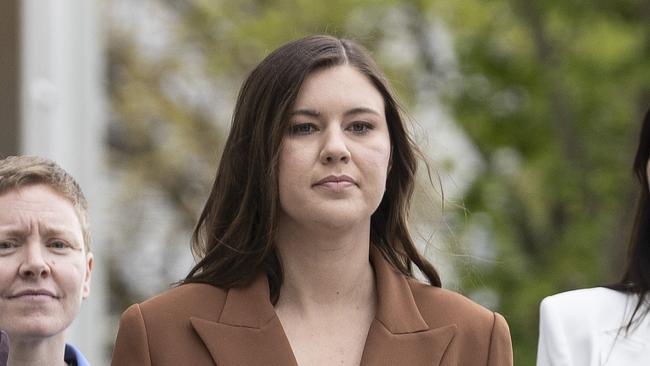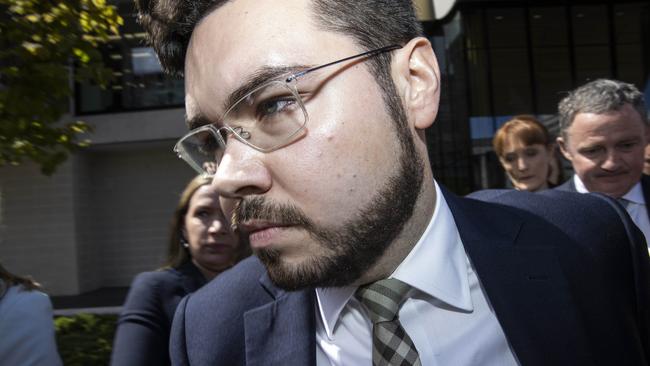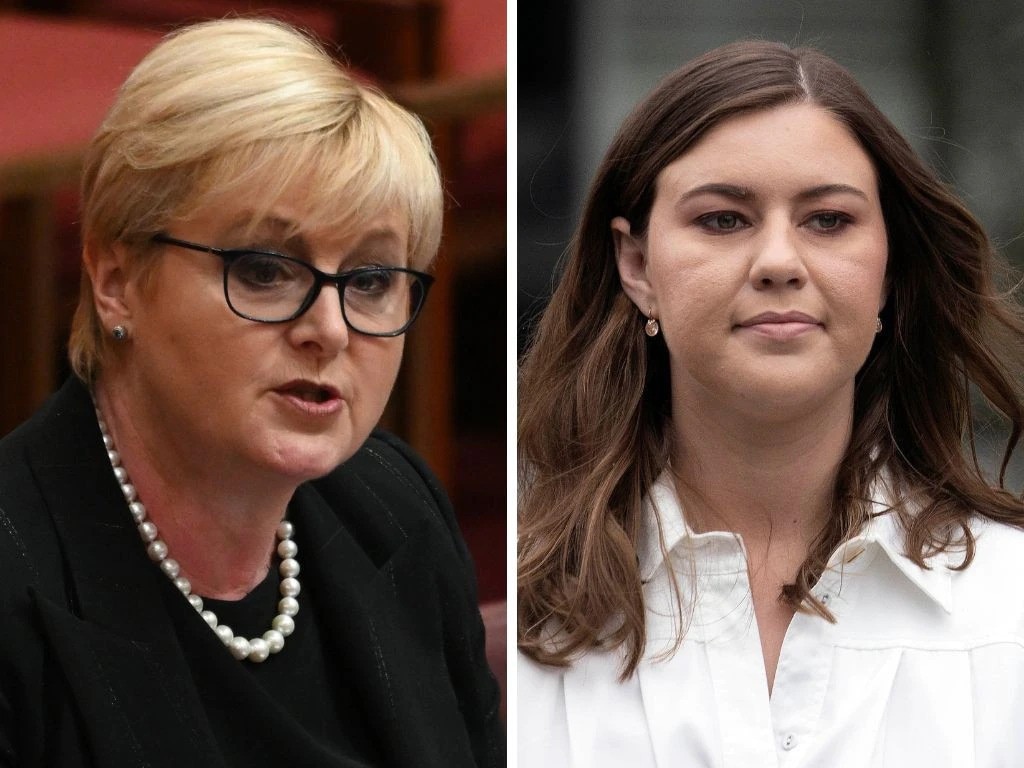The crucial questions arising from Brittany Higgins’ civil claim
Brittany Higgins’ civil claim for close to $3m against the commonwealth will likely be paid without ever reaching a courtroom. But taxpayers deserve answers.

Taxpayers are entitled to assurances from the public servants involved that the department is looking after taxpayers’ interests on at least two fronts. One goes to the processes that will be used to test claims before payments with public money are made. If claims are not tested, taxpayers are entitled to wonder whether integrity standards within the department are open to question.
The second issue goes to politics. The Department of Finance will know that Finance Minister Katy Gallagher was central in pursuing the Brittany Higgins saga against the former Morrison government when she was in opposition. What has the department done to deal with political conflicts, both real and perceived, before it begins mediation on December 13?

Before looking at the process and the politics in this matter in more detail, it is worth reiterating that there is nothing simple, or settled, about the Higgins saga. The criminal court case to test her allegation of rape against fellow staffer Bruce Lehrmann came to an abrupt end after misconduct by a jury member, before the jury could deliver a verdict. Before the mistrial, Higgins’ version of events was contested, and contradicted, in court. Higgins’ claims about her treatment by Linda Reynolds and Michaelia Cash, for whom she worked, were also contested and contradicted in court. The Director of Public Prosecutions has chosen not to pursue Lehrmann.
On behalf of taxpayers, who are invariably left with the bill, may I ask some questions of the department – and the Albanese government – to satisfy ourselves that robust processes are in place before potentially millions of dollars are paid as part of a settlement.
1 Given the size of the claim, why isn’t the department taking the Higgins claim to court? Higgins this week stated that she stands ready to “to defend the truth” in any defamation case brought by Lehrmann. One might assume she is willing to do the same in her civil claim.
2 Before agreeing to settlement with, and payment to, Higgins, has the bureaucrat leading the mediation sought formal legal advice on Higgins’ prospects of success in a court? If so, what did it say? If not, why not?
3 If not in a courtroom, how will the department test the truth of Higgins’ claims? To the extent that her claims in the civil matter coincide with claims in the aborted criminal trial, will the department review evidence from the trial that contradicts Higgins’ claims? Will the department test the veracity of the critical claim that ministers were aware of the sexual assault allegation and that they did not provide her with adequate support? Given Higgins has listed Reynolds and Cash as respondents, alongside the commonwealth, will the department demand that Reynolds and Cash be part of the mediation negotiations next week to provide their version of events. Will the department request statements given by other witnesses to the AFP that challenge Higgins’ claims that she was not adequately supported and that she was harassed and bullied? Will the department review contemporaneous notes written by Reynolds’ acting chief of staff Fiona Brown that likewise contradict Higgins’ claims?
4 Is the department considering the media’s role or whether Higgins or others bore any responsibility for the position that Higgins describes in her Statement of Particulars, including that she has a significantly reduced ability to work in the future and suffers from continuing mental health issues? It is public knowledge that Higgins chose to go to the media before she went to police. She chose not to avail herself of the legal protections for a complainant in a sexual assault matter, including giving evidence in a remote witness room and entering the court privately where cameras are not permitted. Higgins voluntarily became the public face of a #MeToo campaign, joining the Women’s March and seeking publicity; she was used to promote the careers and profiles of many journalists and political actors who have supported her, and exploited her to prosecute the former Morrison government for its alleged problem with women. Will the department pursue cross claims against any others who may have contributed to the position Higgins finds herself in?
5 If the department does not test the veracity of Higgins’ claims before agreeing to a settlement and payment to Higgins, how can the department, on behalf of the commonwealth, be meeting its obligations to act as a “model litigant” under the Legal Services Directions? Obligations in Appendix C, headed Criteria For Settlement, include this direction: “Settlement on the basis of legal principle and practice requires the existence of at least a meaningful prospect of liability being established. In particular, settlement is not to be effected merely because of the cost of defending what is clearly a spurious claim.” Can the department assure us that it will follow the additional criteria set down in those guidelines that apply to settlements over $100,000?
6 If the department is not planning to test the veracity of claims against it and former ministers before potentially settling this matter next week, including with a multimillion-dollar payout, how can taxpayers know that taxpayer money is being paid for valid claims?
7 Is the department considering the potential for copycat claims given the precedent it will set if it does not test the veracity of Higgins’ claim and the politics that are at the centre of this saga? This column asked similar questions in relation the $650,000 payout to Rachelle Miller. Questions arising from this Higgins matter point to a possible pattern of payouts by the department without the veracity of claims being tested. What other similar payments have been made that we do not know about?
Turning to the politics of this saga, here are further questions for the department, and for the Albanese government:
1 How is the department dealing with political conflicts that surround the Higgins civil claim? The Australian reported last week that the AFP expressed concern there was “political interference” in the criminal matter. It is on the record that Higgins’ boyfriend, David Sharaz, outlined the strategy behind the timing of her expose of alleged rape. During the trial, as the media reported, in an extract of a six-hour recording in 2021 involving staff at Channel 10’s The Project, Sharaz is heard saying they wanted the allegation to be exposed at the start of the parliamentary sitting week and that he had a “friend” on the Labor side – now known to be Gallagher – who would “probe and continue it going”. “So sitting week, story comes out, they have to answer questions in question time, it’s a mess for them,” he said. The Australian has been told that the draft Statement of Particulars from Higgins listed Morrison as a respondent, along with the commonwealth, Reynolds and Cash, despite the Particulars listing no substantive claims about the former PM. His name was subsequently removed as a respondent.
The department will be cognisant of the fact that the Albanese government has a powerful political motive to ensure Higgins receives a large payout. The higher Higgins’ settlement, the worse the former Morrison government looks. A cheeky observer might suggest that Gallagher might wish that Higgins receive an extra million or so to heighten the damage to the former Liberal government.
2 In light of the political conflicts, will the department insist that Gallagher recuse herself from any involvement in this claim?
3 Who in the Albanese government can sign off on any settlement with Higgins without the suggestion of political interference by a government that in opposition used the Higgins allegation for its political purposes?
4 In light of this, isn’t the only way to protect taxpayers and avoid the appearance of wrongdoing in public office for the commonwealth to take this claim to a final verdict after a fully contested hearing run on its behalf by an independent law firm?
Nobody would dispute a complainant’s right to compensation if they are injured or mistreated at work, subject to any appropriate reduction to reflect the complainant’s contribution to the injury. However, it is equally obvious that the public has a right to be confident that compensation is awarded, and is seen to be awarded, only in proper cases and after proper due diligence. Payments, particularly big payments, in cases that are complex, contested and/or politically sensitive deserve thorough scrutiny. The potential for big payments to create incentives for future bad behaviour by others or to reward dubious political strategies is obvious. At worst, there is significant potential for corruption.
Could this be the first big job for the new National Anti-Corruption Commission?





Brittany Higgins’ civil claim for close to $3m against the commonwealth deserves close scrutiny. The Weekend Australian understands that this claim, set down for mediation next Tuesday, will likely be settled by the Department of Finance and paid for by taxpayers. In other words, it may never reach a courtroom.